At our annual event in London, executives from banks, fintechs and companies focused on opportunities, as well as risks, in the era of Big Data.
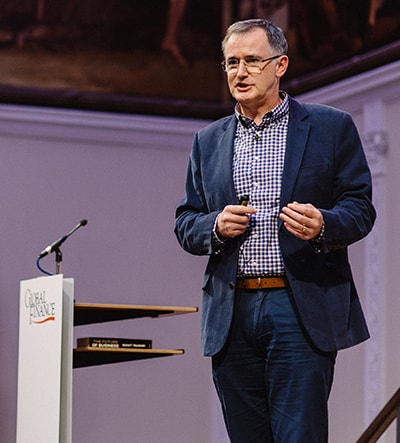
The Global Finance Digital Bank Conference convened in the same room where, in 1877, Alexander Graham Bell, a fellow of the Royal Society for the Encouragement of Arts, Manufactures and Commerce (RSA), gave the first practical demonstration of the telephone. It was an apt location, given that computer networks are the core of modern communication.
Just as Bell’s transmission of voice data changed the way we live, the digitization of data now touches almost every aspect of our lives—which is why we chose data as the main theme of the day.
Paul Cobban, chief data and transformation officer for DBS, gave the opening keynote. He recalled that on his first day (in 2009) at the Singapore-headquartered bank his taxi driver quipped that DBS, then known for its bureaucracy, stood for “damn bloody slow.” Paul was asked by CEO Piyush Gupta to focus his attention on an agile transformation that would eliminate waste and save 250 million customer-hours per year.
Today, DBS is rightly lauded for its digital leadership. Cobban had a “lightbulb moment” in talking with a customer who called to replace a stolen credit card. She had lost her entire handbag, including debit card, credit cards from other issuers, and personal documents. Cobban realized her problem went beyond the card, and the exchange resulted in a new approach to customer service that involves showing empathy, explaining processes, and providing additional useful phone numbers. It prompted DBS to shift its design thinking to “customer journeys,” empathizing with them to create solutions to real-life problems.
Cobban revealed how the bank changed the signage on a line of ATMs eight times to rectify an anomaly that saw customers withdrawing from the machine on the left and depositing to the right—a result of poor wording on the machines. New workshops known as Process Improvement Events (PIEs), hackathons with start-ups instead of executive training days, and getting rid of a pervading HiPPO (Highest-Paid Person’s Opinion) mentality have brought real innovation and customer satisfaction to the bank.
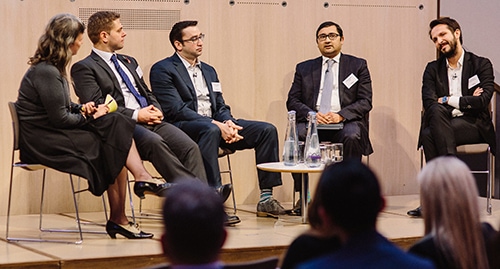
Today, DBS likes to see itself as the D in “Gandalf” (Google, Amazon, Netflix, DBS, Apple, LinkedIn and Facebook), and Cobban closed his keynote by revealing that DBS had launched over 150 application-programming interfaces (APIs) that morning. By launching the world’s largest API-developer platform, DBS is looking to foster innovation; and by using existing data in nontraditional ways, it hopes to improve experiences for DBS customers and partners.
Data Ethics
The first panel, “From Data to Differentiator,” looked at how bank data facilitate better customer service, and addressed some of the ethical and security dilemmas. Michael Friedman, managing director of Management Information and Analytics for Scotiabank, highlighted data’s importance by commenting that it is not possible to start a company today without data at its core.
Deniz Güven, global head of design and client experience at Standard Chartered, spoke of how collaboration and partnerships—including a regulatory sandbox with the Monetary Authority of Singapore and a multiyear partnership with A*STAR’s Institute for Infocomm Research—would support greater data-science innovation. Such partnerships will enable Standard Chartered to provide better customer experiences following analyses of both structured and unstructured data.
With data-science skills in short supply, the panel agreed on the importance of academic partnerships. “While banks are looking at more-practical problems, universities are looking at more-theoretical ones,” stated Friedman, explaining the appeal of keeping an eye on future developments.
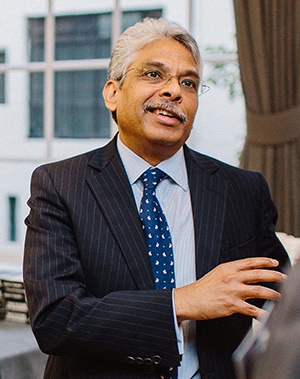
One such development shared by Amit Vasudeva, vice president, client partner and head of sales for Financial Services at Infosys, is using psychological profiles derived from not what consumers say but how they make financial transactions. A customer who is spending too much on eating out might be advised to cook at home or be offered a credit card or loan if they were overdrawn. While banks are more secure with their data than social media, such profiling still brings ethics to the fore.
While Güven sang the praises of a service offered by German challenger bank N26 that alerted him to an Uber overcharge, Friedman revealed that he spurned coffee points cards, despite their benefits, as he didn’t want anyone collecting that data. This all reinforces the view that instead of a thin line between privacy and customization, there is a fuzzy field—in no small part because different consumers have different tolerance levels for use of their data. Tom Jenkins, head of Science and Innovation at Deutsche Bank, said archaic language makes it difficult for consumers to understand data privacy.
With data, size definitely matters, as scale becomes both a differentiator and a strategic asset. “We’ve always had data, but we now have the tools to make better use of our data and the scale of data that we have developed,” said Citi’s global head of Channel and Enterprise Services, Treasury and Trade Solutions, Tapodyuti Bose. “Our ability to analyze that data, to identify trends, to create best practice, to make comparisons and to highlight opportunities for efficiency enhancements is exactly what many fintech firms strive for in their quest for scale. And this is the point where we add value to our clients.”
Having invested heavily in a data lake helps Citi contextualize services and provides a long view of information. “It completely changes the level of precision,” adds Bose. “We can better understand our clients and have a laser focus on [their] pain points.”
In the second keynote, Rohit Talwar, CEO of Fast Future Research, explored how banks can create a very human business in a digital world: with a “world of perfect knowledge” predicted for 2025 (according to a popular meme on social media), when there will be “100 billion Internet of Things devices,” with “a trillion sensors,” resulting in a “$19 trillion” impact, Talwar said. Yet banks can still drive technological efficiencies and think about people’s needs, he said, citing Alibaba’s successful online pharmaceutical sales as an example of understanding data flows and people.
Partner Benefits
For our second panel, “Platforms Not Partnerships,” our panelists discussed how open banking and APIs would impact the finance sector. Natasha Kyprianides, group head of Digital Banking and Innovation at Hellenic Bank, revealed how Hellenic adopted APIs to accelerate transformation and encourage customer acquisition following the Cypriot financial crisis. She said Hellenic mapped out its strategy from the get-go and chose a B2B use case, where business customers can transmit payments in real time from within their ERP platform (an enterprise resource planning system; essentially an accounting system).
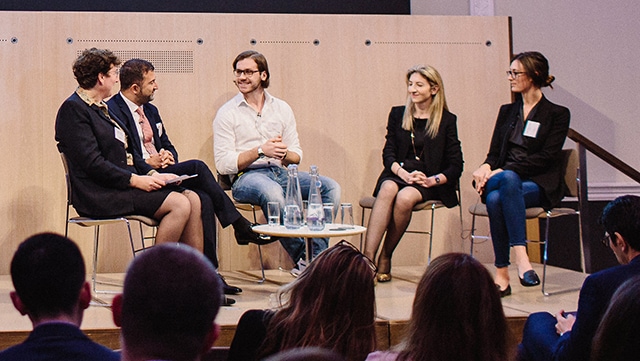
Timo Meyer, market expansion lead at N26, explained how APIs helped the German mobile-only bank rapidly rack up 500,000 customers across Europe after receiving a banking license only in July last year. N26 operates a mobile marketplace where open APIs allow third party services, such as TransferWise (currency transfer) and Raisin (investment) to be accessed from within their own platforms.
TEB has worked very closely with start-ups to encourage innovation; and Deniz Devrim Cengiz, group director of Digital Banking at TEB, admitted that the Turkish bank could have been faster to adopt APIs but was at that time launching new digital features from third parties. “Working with fintechs creates a buzz and encourages both the business and the IT guys,” said Cengiz, warming to the benefits of collaboration.
Moven, a challenger bank that realized the importance of partnerships with traditional banks, established Moven Enterprise to sell the company’s software directly to other financial institutions. Taylor May Woolsey, business development and marketing manager at Moven Enterprise, said the loyalty that customers have for their own bank means the majority stick with incumbents, creating big opportunities for banks who are open-banking first movers.
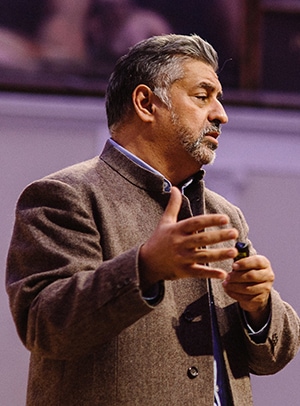
N26’s Meyer believes that under the Revised Payment Services Directive (PSD2) and other open-banking initiatives, it will no longer be important who is the treasurer of customers’ funds—but only where customers make their next financial decision and what the choice is. “On the one hand it’s all about the technology,” he says, “but you need to educate your client base to make them understand what is happening with their data and explain why it is beneficial to them.” Kyprianides, on the other hand, said customers don’t care about open banking. She described Hellenic’s marketplace approach: cross-selling third-party products to existing customers who feel secure in their trust of the bank.
Jonathan Liebenau, associate professor (reader) in Technology Management at the London School of Economics, noted data breaches have not been as great a reputational risk as predicted 10 years ago. “We have become somewhat inured to it,” he said. “This increasing level of tolerance is why reputational risk has not destroyed many companies.”
Liebenau closed the event with an overview: “Banks need to look at the competitive situation and jump on the personalization bandwagon,” he said. “Our experiences as customers of Google and Amazon, and what we imagine Facebook is doing for us, are all-pervasive. We think of it as part of our lives.”
WORLD’S BEST DIGITAL BANKS 2017 — GLOBAL WINNERS
|
GLOBAL WINNERS – THE WORLD’S BEST DIGITAL BANKS |
|
|
World’s Best Digital Bank |
Citi |
|
Best Corporate/Institutional Digital Bank |
Citi |
|
Best Consumer Digital Bank |
Standard Chartered |
|
Best Islamic Digital Bank |
Boubyan Bank |
|
REGIONAL WINNERS – BEST CORPORATE/INSTITUTIONAL DIGITAL BANKS |
|
|
North America |
Wells Fargo |
|
Western Europe |
Citi |
|
Asia-Pacific |
Citi |
|
Latin America |
Citi |
|
Central & Eastern Europe |
SEB Banka |
|
Middle East |
Citi |
|
Africa |
Citi |
|
REGIONAL WINNERS – BEST CONSUMER DIGITAL BANKS |
|
|
North America |
Citi |
|
Western Europe |
CaixaBank |
|
Asia-Pacific |
DBS |
|
Latin America |
Scotiabank |
|
Central & Eastern Europe |
Tatra banka |
|
Middle East |
Mashreq Bank |
|
Africa |
Standard Chartered |
|
GLOBAL SUB-CATEGORY WINNERS – BEST CORPORATE/INSTITUTIONAL DIGITAL BANKS |
|
|
Best Investment Management Services |
Wells Fargo |
|
Best Online Cash Management |
Citi |
|
Best Trade Finance Services |
Citi |
|
Best Website Design |
Yapi Kredi |
|
Best Integrated Corporate Bank Site |
TBC Bank |
|
Best Information Security Initiatives |
Citi |
|
Best Online Treasury Services |
Citi |
|
Best in Mobile Banking |
Citi |
|
Best in Social Media |
Odeabank |
|
Best Mobile Banking App |
Citi |
|
Most Innovative Digital Bank |
Citi |
|
GLOBAL SUB-CATEGORY WINNERS – BEST CONSUMER DIGITAL BANKS |
|
|
Best Online Deposit, Credit and Investment Product Offerings |
Standard Chartered |
|
Best Bill Payment & Presentment |
DBS |
|
Best Web Site Design |
Standard Chartered |
|
Best Integrated Consumer Bank Site |
OCBC |
|
Best Information Security Initiatives |
Standard Chartered |
|
Best in Mobile Banking |
Mashreq Bank |
|
Best in Social Media |
CaixaBank |
|
Best Mobile Banking App |
Piraeus Bank |
|
Best SMS/Text Banking |
DBS |
|
Most Innovative Digital Bank |
Yapi Kredi |



